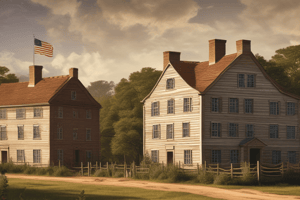Podcast
Questions and Answers
Which colonies were known for their focus on trade, fishing, and small-scale farming?
Which colonies were known for their focus on trade, fishing, and small-scale farming?
- Middle Colonies
- New England Colonies (correct)
- Southern Colonies
- Royal Colonies
What economic activities were primarily associated with the Southern Colonies?
What economic activities were primarily associated with the Southern Colonies?
- Plantations and slavery (correct)
- Manufacturing and shipbuilding
- Fishing and trade
- Fur trading and logging
Which statement correctly describes the Middle Colonies?
Which statement correctly describes the Middle Colonies?
- They were known for urban development.
- They had fertile land and diverse cultures. (correct)
- They emphasized Puritan values.
- They consisted solely of Virginia and Maryland.
What was a significant factor in the economic relationships of the colonies?
What was a significant factor in the economic relationships of the colonies?
Which religious group was predominantly associated with Pennsylvania?
Which religious group was predominantly associated with Pennsylvania?
What was a major cause of tensions leading to the American Revolution?
What was a major cause of tensions leading to the American Revolution?
During which war did significant conflict occur due to the involvement of Native Americans and European powers?
During which war did significant conflict occur due to the involvement of Native Americans and European powers?
Which type of governance was characterized by assemblies having significant power?
Which type of governance was characterized by assemblies having significant power?
Flashcards are hidden until you start studying
Study Notes
Overview of the 13 Colonies
- The 13 colonies were established by Great Britain along the east coast of North America in the 17th and 18th centuries.
- They later declared independence from Britain and formed the United States.
Regional Divisions
-
New England Colonies:
- Consisted of Massachusetts, Connecticut, Rhode Island, and New Hampshire.
- Economy focused on trade, fishing, shipbuilding, and small-scale farming.
- Influenced by Puritan religious beliefs and values.
-
Middle Colonies:
- Included New York, New Jersey, Pennsylvania, and Delaware.
- Known for diverse cultures, religious freedom, and fertile land.
- Economy based on agriculture (grains) and trade.
-
Southern Colonies:
- Comprised of Maryland, Virginia, North Carolina, South Carolina, and Georgia.
- Economy heavily reliant on plantations, tobacco, rice, and slavery.
- Less urban development, with counties serving as administrative units.
Key Facts and Events
-
Colonial Governance:
- Varied from royal and proprietary colonies to self-governing structures.
- Assemblies often had significant power, influencing local laws and taxation.
-
Trade and Economy:
- Triangular trade routes facilitated the exchange of goods, enslaved people, and raw materials.
- Mercantilism influenced colonial economies, emphasizing accumulation of wealth for the mother country.
-
Cultural Aspects:
- Diversity in religion: Quakers in Pennsylvania, Puritans in Massachusetts, and Anglicans in Virginia.
- Education varied, with New England emphasizing literacy for religious purposes while other regions had fewer schools.
-
Conflict and Relations:
- Ongoing conflicts with Native Americans and other European powers (e.g., French, Spanish).
- Key events include King Philip's War (1675) and the French and Indian War (1754-1763).
Path to Independence
- Growing tensions with Britain over taxes (e.g., Stamp Act, Tea Act) and lack of representation led to revolutionary sentiments.
- The Declaration of Independence in 1776 marked a decisive step towards independence, with the colonies uniting against British rule.
The 13 Colonies
- Established along the east coast of North America during the 17th and 18th centuries by Great Britain
- Became the foundation of the United States after declaring independence from Britain
Regional Divisions
-
New England Colonies:
- Massachusetts, Connecticut, Rhode Island, and New Hampshire
- Trade, fishing, shipbuilding, and small-scale farming
- Influenced by Puritan religious beliefs and values
-
Middle Colonies:
- New York, New Jersey, Pennsylvania, and Delaware
- Known for diverse cultures, religious freedom, and fertile land
- Agriculture (grains) and trade
-
Southern Colonies:
- Maryland, Virginia, North Carolina, South Carolina, and Georgia
- Planted tobacco, rice, and relied on slavery
- Counties served as administrative units
Colonial Governance
- Royal, proprietary, and self-governing structures
- Assemblies had significant power over local laws and taxation
Trade and Economy
- Triangular trade routes facilitated the exchange of goods, enslaved people, and raw materials
- Mercantilism influenced colonial economies, emphasizing wealth accumulation for Britain
Cultural Aspects
- Diversity in religion: Quakers in Pennsylvania, Puritans in Massachusetts, and Anglicans in Virginia
- Education varied, New England emphasized literacy for religious purposes
Conflict and Relations
- Conflict with Native Americans and other European powers (e.g., French, Spanish)
- Key events include King Philip's War (1675) and the French and Indian War (1754-1763)
Path to Independence
- Growing tensions with Britain over taxation and lack of representation
- Declaration of Independence in 1776 marked the colonies' united stand against British rule
Studying That Suits You
Use AI to generate personalized quizzes and flashcards to suit your learning preferences.




